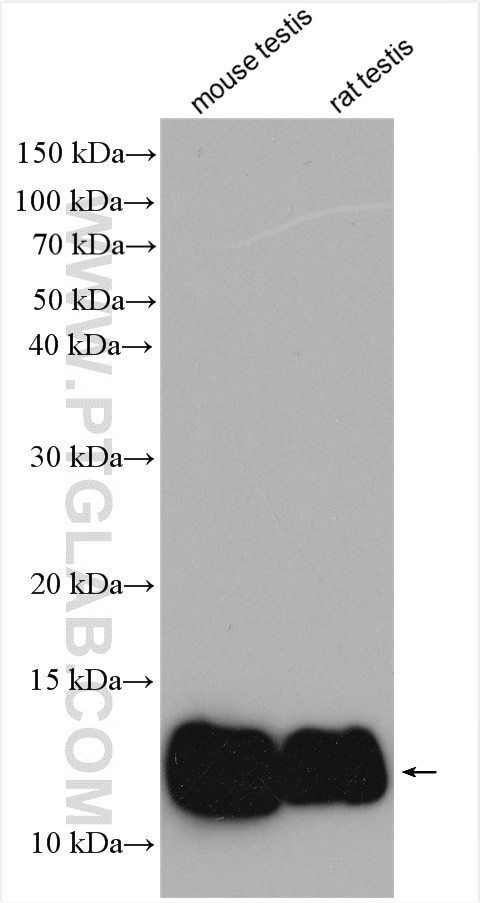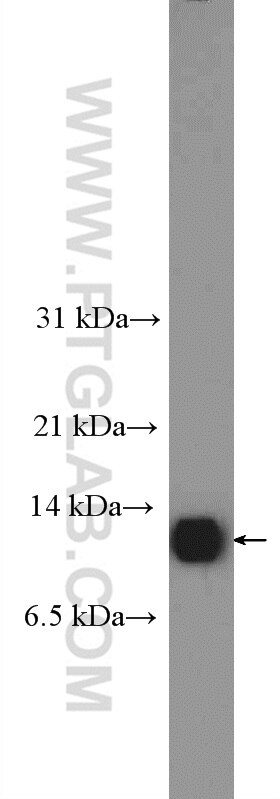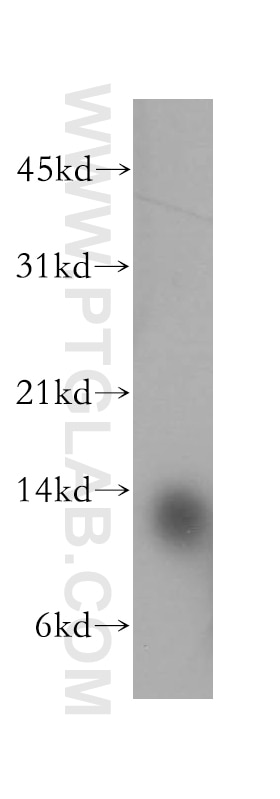Tested Applications
| Positive WB detected in | mouse testis tissue, rat testis tissue, human brain tissue |
Recommended dilution
| Application | Dilution |
|---|---|
| Western Blot (WB) | WB : 1:1000-1:4000 |
| It is recommended that this reagent should be titrated in each testing system to obtain optimal results. | |
| Sample-dependent, Check data in validation data gallery. | |
Published Applications
| KD/KO | See 1 publications below |
| WB | See 2 publications below |
| IHC | See 1 publications below |
| IP | See 1 publications below |
Product Information
13433-1-AP targets ACYP1 in WB, IHC, IP, ELISA applications and shows reactivity with human, mouse, rat samples.
| Tested Reactivity | human, mouse, rat |
| Cited Reactivity | human |
| Host / Isotype | Rabbit / IgG |
| Class | Polyclonal |
| Type | Antibody |
| Immunogen |
CatNo: Ag4237 Product name: Recombinant human ACYP1 protein Source: e coli.-derived, PGEX-4T Tag: GST Domain: 1-99 aa of BC035568 Sequence: MAEGNTLISVDYEIFGKVQGVFFRKHTQAEGKKLGLVGWVQNTDRGTVQGQLQGPISKVRHMQEWLETRGSPKSHIDKANFNNEKVILKLDYSDFQIVK Predict reactive species |
| Full Name | acylphosphatase 1, erythrocyte (common) type |
| Calculated Molecular Weight | 99 aa, 11 kDa |
| Observed Molecular Weight | 11 kDa |
| GenBank Accession Number | BC035568 |
| Gene Symbol | ACYP1 |
| Gene ID (NCBI) | 97 |
| RRID | AB_2242288 |
| Conjugate | Unconjugated |
| Form | Liquid |
| Purification Method | Antigen affinity purification |
| UNIPROT ID | P07311 |
| Storage Buffer | PBS with 0.02% sodium azide and 50% glycerol, pH 7.3. |
| Storage Conditions | Store at -20°C. Stable for one year after shipment. Aliquoting is unnecessary for -20oC storage. 20ul sizes contain 0.1% BSA. |
Protocols
| Product Specific Protocols | |
|---|---|
| WB protocol for ACYP1 antibody 13433-1-AP | Download protocol |
| Standard Protocols | |
|---|---|
| Click here to view our Standard Protocols |
Publications
| Species | Application | Title |
|---|---|---|
Drug Resist Updat Targeting ACYP1-mediated glycolysis reverses lenvatinib resistance and restricts hepatocellular carcinoma progression
| ||
Int Immunopharmacol Pterostilbene suppresses the growth of esophageal squamous cell carcinoma by inhibiting glycolysis and PKM2/STAT3/c-MYC signaling pathway |








